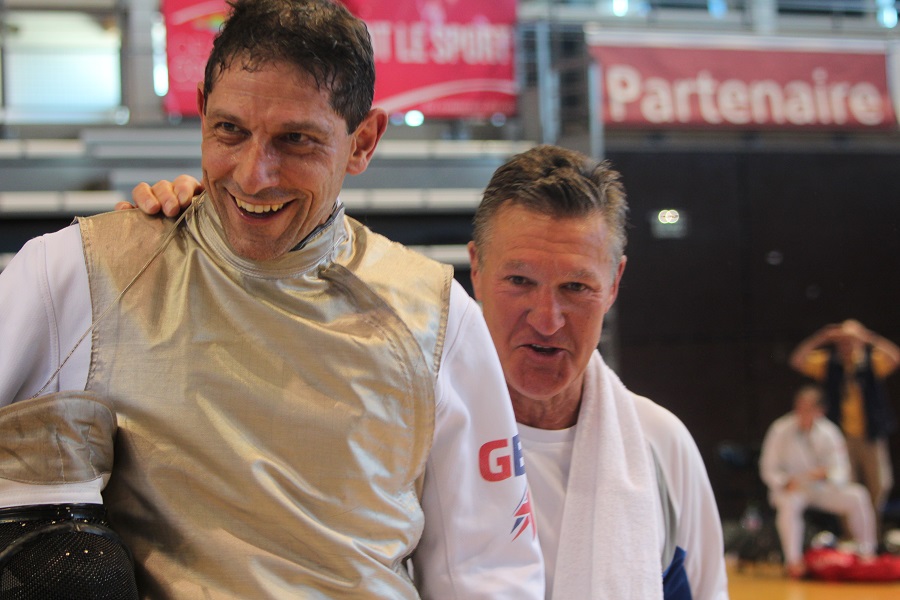We use cookies
Using our site means you agree to the use of cookies and similar technologies. Read about our policy and how to disable them here
When we transition from being kids to being adults, somewhere along the line it seems that personal enrichment and (dare we say it?) fun fall down the priority list to somewhere behind folding laundry and reconciling our bank statements.
That’s not to say that those things aren’t important, but in order to be whole and healthy, we have to do more than just get up, go to work, and take care of our household.
When looking for enriching activities that can help adults to find that balance, fencing offers an excellent opportunity to make life more interesting and healthier all around.
What adults don’t need is another addition to their mental load. What they do need is a way to unwind those long strands of stress that are wrapping around their brain cells. Fencing is often called “physical chess”, and that chess game provides some surprising benefits for adults who fence.
The mental engagement that fencing offers is akin to doing puzzles or sudoku. From the very start, you’re engaging your brain to figure out how to get that point and how to avoid your opponent scoring a point. Fencing is detail-oriented, requiring a great deal of brainpower to determine where and when to move the weapon. As much as there is physical dexterity involved in this sport, there is an equal amount of mental dexterity required. This is something that fencers develop over time and with consistency.
Though it can seem counterintuitive, doing these kinds of activities where the brain is so heavily engaged actually gives the mind the right kind of stimulation to relieve stress. A 2019 study out of the University of Alicante in Spain found that chess had a positive effect on cognitive health in adults, warding off the worsening symptoms of dementia. Why? Because the game pushes the brain to use critical thinking skills, make calculations, and engage visual-spatial skills. Oh, and it’s good for memory, too.
Fencing does all of these same things. Fencing forces your brain to constantly adjust what it’s doing, making quick changes to accommodate the opponent and whatever new information they’re giving you. There are constant calculations to be made - how far away is the tip of the blade? How fast are they moving and when will they get close enough to get a touch? Both of these also challenge those visual-spatial skills, as well as using critical thinking.
Note that none of these benefits have anything to do with you being a star fencer - the mental health boosts for adults are derived from recreational fencing just as they are from competitive fencing.
The mental benefits of fencing are worth engaging with for every adult.

It’s a widespread joke that you get aches and pains with every passing decade. Our bodies naturally start to slow down when we get older, and that can make it hard to get on the horse and get fencing.
Fencing is not just about physical agility. Speed and stamina are important yes, but those are skills that adult fencers can build over time. When you step onto the fencing strip, there is no one set way to get a point on your opponent or to avoid being touched. Creativity and mental agility are central to success in fencing. It’s more than just physical fitness that matters.
Even if you have an injury, there are ways to continue to train while you rehab it. Adults sometimes come to the sport with specific limitations, but that’s not a reason not to try fencing. A great fencing club and coach will be able to help you work around whatever you might have. We’ve seen fencers with a range of abilities enjoy the sport as adults, and often go on to be fierce competitors thanks to their resilience.
That’s not to say that physical fitness is not a big benefit of training in fencing. Fencing training is part cardio (the dreaded exercise!), part weight training, and part agility course. Spatial awareness and body control are developed through fencing. Even training in fencing for one night a week brings these benefits, which also raise the overall physical health of adults.
All of this is couched in terms of starting where you are and progressing forward. Not matter what your level of fitness is when you come into fencing, that’s where you begin. It can be intimidating for adults who don’t feel like they can keep up to come into a sport. This is why fencing is a great place to start, because fitness level is not the only factor.
The physical fitness benefits of fencing, no matter where you start from, are worth it for adults.

The final thing that we come to is the sheer joy of this sport. Fencing is fun. It’s exciting. It’s exhilarating. There is almost nothing out there that feels as powerful and empowering as holding a sword and looking up at your opponent.
It’s fast paced but with quick rounds, and bouts go by so quickly that they have both an urgency and a disposability about them. You didn’t do well in a fencing bout? That’s ok - you’ll bout again shortly and then you’ll be able to do better or worse in the next bout, but either way, you’re not trapped in your current situation. There’s another chance.
This constant cycling of going against an opponent is one of the most joyful things about fencing, because it keeps things fresh. In adulthood, it can seem like every decision we make has such weight and so many consequences. In fencing, if you lose a touch or a bout or a match, well that’s ok because there’s another opportunity for you to get back in and do it again.
There is something positively enthralling about fencing, I would say for adults even more than for children. So often, we as adults don’t create space in our lives to let go and have fun. There are certain, prescribed times that we allow ourselves to let go, but they tend to be rare and not always healthy. Fencing is an alternative that is both very healthy and also absolutely satisfying.
That satisfaction is important for adults. A 2019 study of athletes in Sweden found that they were less likely to drink alcohol in excess, as well as being more in tune with their bodies and able to ward off some mental health problems. When we don’t fill our time and our minds with positive things, they will fill up with something. Fencing offers a strong alternative to other, less healthy habits.
Habits are all about filling your time with things that make you grow while they make you happy. If you’re cultivating good habits, then there’s less room for the bad ones. A sport like fencing is a way to fill your time with something that you know is good for you, but it’s something that you can also feel happy doing.
The joy of fencing is a key aspect that’s worth exploring for adults in fencing.
It’s not just about the positive things that fencing itself brings to you, it’s also about the connections that you make with fellow fencers and coaches in a fencing club. The fencing community is a fantastic place to be. It’s supportive and patient, and most of all it’s passionate. That passion is infectious.
Though fencing is not a team sport, even in team fencing the sport is still one-on-one for each bout, there’s very much a team spirit to it. Walking into a fencing club is walking into a community. Our sport is small, and so even in a larger club you’ll find that the people all know each other and cheer each other on.
Fencers want to see each other succeed, in no small measure because when the fencers in your club get better, then you have better people to spar against and that makes you a better fencer. A rising tide lifts all ships. The more you fence and the more you work with other fencers, the better your experience will be. Even with our opponents on the strip during fierce competition, there is still a level of respect and support among fencers that feels good.
The fencing community makes adult fencing worth it.
Competition is a major way that fencing builds community, and adults can compete their entire lives - there is no age limit on competitive fencing, even at national competitions. There are age categories all the way up to 80+!
You don’t have to compete nationally, and certainly it takes years to get to that level, but it’s a good thing to have in your back pocket as an adult. In many sports, youth is far favored over longevity. There are lots of recreational sports programs for adults, but there’s very much a sense that once you get a few decades under your belt, competition is no longer for you.
In fencing, there’s no sense of “leave competition to the young people.” Competitive fencing among adults, whether they have youth experience or are newer to the sport, is still compelling. Fencing is fencing, and there is an inherent excitement to a competitive bout for any age.
While an adult fencer who starts the sport in midlife or later is unlikely to make it to the Olympics, it’s not out of the question to compete nationally, not at all. It’s worth noting here that many fencing Olympians are on that stage in their 30’s, older than many of the other Olympic sports that we think about. It’s not as much about the body in fencing as it is about the mind, so the experience that age brings to the strip is valuable.
Competition is rewarding because it stretches you and challenges you. In competitive fencing, the stakes feel higher, which makes you work harder, even at the local level. Yet even though the stakes are higher than they are in a normal club setting, they are still not nearly as high as the stakes in your adult life. For those of us with a lot of outside pressure, stepping onto a fencing strip for competition can be a major pressure release valve. The intensity in a controlled environment. If you miss a touch, what’s the worst that can happen? Nothing really, except that you get to try again another weekend.
The experience of competition, win or lose, is exciting. It builds confidence. It builds character. It makes your life as a fencer much richer and your life as an adult more resilient.
Competition at any level is worth dipping your toe in as an adult fencer.
In our club, we often see adult fencers come in with some trepidation. It’s understandable. Sometimes they’re parents whose kids are fencers, other times they’re adults who have seen fencing and just want to give something new a try, and sometimes we see people come in who fenced when they were younger and want to see whether they still enjoy it or are still good at it. Whichever way, it can be hard to come into a sport when you’ve got an established life and lots of responsibilities.
When you’re a kid and you try something new, everyone expects you to have a learning curve. In fact, as a kid you’re in learning mode. For adults, especially after you cross into your 30’s, 40’s, and 50’s, there’s an expectation that you know what you need to know to make your way in the world. That’s true, but unfortunately it can make it hard for adults to try new things. Especially if they feel out of shape or even if they have fencing experience in their past and it doesn’t feel quite the same.
The chance to try something new makes taking an introductory fencing class worth it for adults.

One of the worst things for adults, at least in my opinion, is that we take ourselves so very, very seriously. There’s this notion that I, as a thoughtful and experience grownup, should know before I start whether I’m going to like something and so commit to it early on. The problem with this mindset is that it keeps us from trying things!
Take the fencing class. Sign up for a month of lessons. All you need is a pair of tennis shoes and some comfy clothing that you can move in.
Whether or not you end up sticking with fencing for the long haul, it doesn’t matter.You could go into the fencing club and find yourself totally there and into it, but then find out after a couple of months of lessons that it’s not a good fit. You could also go in and find out after a couple months that fencing is totally amazing for you and that you want to continue.
Do you know a sure way to never find out? That’s right - you’ll never find out if you don’t go try it. It’s not about lists of mental or physical health benefits, it’s about finding something that brings joy into your life. We all need more of that, and fencing just might turn out to be one of the things that brings you that joy.
This blog was written by Igor Chirashnya. He has contributed some amazing and insightful blogs for fencers over the years. Here are some of Ben Paul's favourites:
Travel tips for fencers: https://academyoffencingmasters.com/blog/41-helpful-travel-tips-for-fencing-competitions/
An interview with Barry Paul: https://academyoffencingmasters.com/blog/barry-paul-talks-fencing/
For more great Blogs and interviews on fencing and coaching, visit the link below and check out their back catalogue: https://academyoffencingmasters.com/blog/

